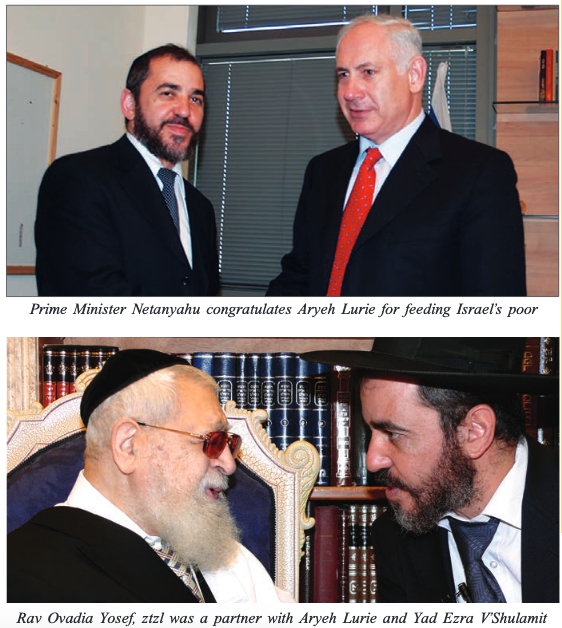Aryeh Lurie was only eight years old when he learned how angrily and loudly empty stomachs growl. When his mother sent him to school without any lunch, he watched his friends bite into their sandwiches, and something stirred within him— an indelible pain—that led him to build the largest food distribution network in Israel which feeds 180,000 people every year.
“I’m not the Prime Minister, or a millionaire, I’m just a regular person,” said Aryeh. “When I started, I had no idea that the few baskets I gave out would skyrocket. I just knew I had to act. I’ve been there; I grew up poor. You can’t ignore a hungry child. I couldn’t sleep knowing Jewish children are going to sleep on empty stomachs, especially when so many are Sephardim.”
Born to a Persian mother and an Iraqi father, Aryeh inherited the Sephardic community’s strong values of supporting the needy, and loving every Jew.
You Should Always Care for Other People
“As a child, after kiddush, my mother would hand me a bowl of hamin, saying, ‘Go give this to our neighbor,’” began Aryeh, “There was no meat in the pot and we barely ate, ourselves, yet when you’re poor you develop a sensitivity to others.”
He continued, “Growing up poor isn’t all bad. The problem begins when it damages a child’s self-esteem. People mean well, but end up causing damage. I once stood in a line for a free bag of potatoes, when someone handed me an old, dirty toy. I felt humiliated. That person thought he was doing a huge mitzvah, but I went home crying. A poor person’s dignity is more important than anything you can give him.”

Yad Ezra V’Shulamit, which started as a humble non-profit in 1998, with two employees, one truck, and a driver, has since grown into a national enterprise providing comprehensive services to the needy. It now distributes 3,000 food baskets a week, and close to 40,000 before the festivals—feeding over 180,000 people during Pesach alone.
To date, Yad Ezra V’Shulamit has distributed over 1,000,000 baskets, and serves a daily hot lunch to more than 500 children. It also gives a monthly stipend to over 500 widows, and provides baby formula for mothers who can’t afford to feed their babies.
“As a student, I saw many kids who didn’t finish their food. I collected their leftovers and distributed them to hungry students for whom that food was a lifesaver,” Lurie said.
Today, 30 years later, YES distributes roughly 40 tons of food on a weekly basis. Visit the YES warehouse on a Thursday afternoon, and you’ll see volunteers packing chickens, challahs, fresh produce, canned goods, grape juice and other groceries, into hundreds of individual baskets.
Unfortunately, the myth that everyone is wealthy because Israel is known as the Start-Up Nation, clouds the fact that 21% of Israelis live below the poverty level. The rich in Israel get richer, while the billions in proceeds from high tech buyouts, do nothing to help those truly in need. In Israel today, 1% of the population makes more money than the entire bottom fifth of people who live under the poverty line.
Aryeh—whose grandfather and great-uncle smuggled food into Jerusalem via the Burma Road during the siege of 1948—admits, “The power to help others is born of feeling their pain. I promised myself that when I grew up, I’d take care of hungry children.”
Driven by the vision of an after-school center that would provide meals, counseling, school supplies and homework help to poverty stricken families, Aryeh moved his entire family into a rental apartment, to make room for the center. “How could I stay, with children going hungry?” he asked.
Before Pesach, Prime Minister Netanyahu addressed donors, saying, “There are still families needing assistance, which is why I support Yad Ezra V’Shulamit. I know you’re doing your best, but I want you to do more—give from your heart to the heart of a young child”.
The Biggest Joy of All
At this time of year, with Pesach around the corner, poverty is most acutely felt.
The Passover food stipend granted by the Welfare and Finance Ministries amounts to a meager 13 shekels (under $4) per family. It doesn’t even buy a single box of matzah.
But, Yad Ezra V’Shulamit is committed to making Pesach a time of joy.
“This Pesach, when I sit at my Seder table, after distributing 35,000 food baskets throughout Israel,” Lurie began, “I’ll know I did all I could. That gives me the greatest joy”.
“I’d love to close down Yad Ezra V’Shulamit. We wish children would eat without our support; that every widow and orphan could be proudly independent… But until Mashiach comes, our doors will be open to anyone in need.”
To make someone happy with a Pesach food basket, visit www.yadezra.net/Passover.